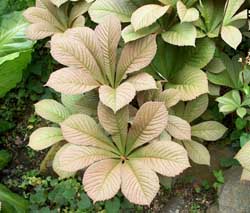 Herbaceous perennials are
plants that live more than two years and do not form
woody stems so that they die back to ground level each
fall. Hostas, of course, are part of this group of
plants as are thousands and thousands of other commonly
grown landscape plants.
Herbaceous perennials are
plants that live more than two years and do not form
woody stems so that they die back to ground level each
fall. Hostas, of course, are part of this group of
plants as are thousands and thousands of other commonly
grown landscape plants.
Fortunately, hundreds of
species of plants also share the ability of hostas to
grow and thrive in low light conditions. Some of these
plants developed in woodland areas where they adapted to
full sun in the early spring before the leaves came onto
the trees. Others found their niche on the edge of the
forest where they received full sunlight for at least
part of each day. Still others found their fate tied to
the shade at the middle of the woods where they rarely
received any direct sunlight but survived on the light
reflected from the nearby environment.
Here are just a few
of the more common herbaceous perennials that are
used in combination with hostas in shade gardens:



